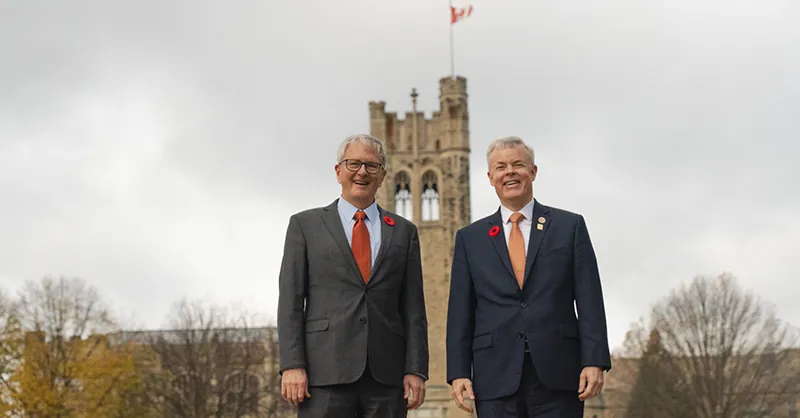
U.S. Consul General Baxter Hunt Visits Western University to Foster Bilateral Cooperation
2024-11-05
Author: William
Overview
On October 31, 2024, U.S. Consul General in Toronto, Baxter Hunt, made a notable visit to Western University, underlining the institution's remarkable connections with U.S. students, scholars, and medical research organizations. This visit comes at a crucial time as collaborative efforts between Canada and the U.S. in higher education and research continue to strengthen.
Engagement and Facility Tour
During his time at Western, Hunt engaged with university leaders and toured the state-of-the-art Imaging Pathogens for Knowledge Translation (ImPaKT) facility. This cutting-edge facility is pivotal for advancing the understanding of infectious diseases through cellular and animal imaging technologies, allowing for real-time visualization of infections. Hunt expressed his admiration for the groundbreaking work occurring at Western, particularly in the realms of entrepreneurship, climate research, and health.
“I was very impressed with the university's contributions,” said Hunt. “The ImPaKT facility is at the forefront of infectious disease research, especially with the new pathogen research centre soon to be operational.” His appreciation highlights the significance of such initiatives in the face of pressing global health challenges.
Research Collaborations
Western University boasts a flourishing network of partnerships with American educational institutions, fostering unique student experiences and innovative research opportunities. In the past five years alone, Western researchers have collaborated with U.S. counterparts on over 7,000 publications, with notable partners including Harvard University, the University of California San Diego, and the Mayo Clinic.
In terms of funding, Western has received substantial support from U.S. organizations such as the National Institutes of Health (NIH) and the National Science Foundation. Currently, 88 researchers at Western hold NIH grants, focusing significantly on neuroscience and aging.
Statements from Leadership
“Canada and the U.S. have a unique history of collaboration,” stated Western President Alan Shepard. “This partnership is reflected not only in our geopolitical relationship but also among the academic and research collaborations we cultivate.”
Schulich School’s Achievements
The Schulich School of Medicine & Dentistry, in particular, has gained recognition for its leadership in infectious disease research, which has translated into substantial U.S. funding. Over the last five years, the faculty has attracted more than $7.5 million in NIH grants, driving forward various innovative biomedical projects.
Dr. John Yoo, the dean of Schulich Medicine & Dentistry, noted that the school's research capabilities, including high-containment facilities, position it as a leader in combating health threats. Recent initiatives include studies on cognitive resilience in "Super Agers" and advanced imaging techniques for monitoring cell-based cancer therapies.
Spotlight on Research Grants
In a spotlight moment, Eric Arts, a Canada Research Chair in HIV Pathogenesis, shared insights about a nearly $2.4 million NIH grant aimed at enhancing the understanding of HIV transmission to ultimately improve vaccine efficacy. Meanwhile, Dr. Robyn Klein is spearheading a $1.8 million NIH-funded research program investigating the effects of infectious diseases on cognition.
The ImPaKT Facility
The ImPaKT facility, which opened in 2019, continues to be instrumental in analyzing how viruses like SARS-CoV-2 affect human health. In response to the increasing need for advanced research on health threats, Schulich Medicine is expanding its facilities, including a new microbial transmission lab that will enhance the capacity to study real-world transmission factors.
“Not only will we be able to study virus transmission strategies, but we’re also integrating a manufacturing facility that will allow us to develop and test new therapeutics and vaccines here at Western,” emphasized Arts.
Conclusion
As the collaboration between Canadian and American institutions flourishes, the commitment to tackling pressing global health issues remains strong, ensuring both nations benefit from shared expertise and innovative solutions.









 Brasil (PT)
Brasil (PT)
 Canada (EN)
Canada (EN)
 Chile (ES)
Chile (ES)
 España (ES)
España (ES)
 France (FR)
France (FR)
 Hong Kong (EN)
Hong Kong (EN)
 Italia (IT)
Italia (IT)
 日本 (JA)
日本 (JA)
 Magyarország (HU)
Magyarország (HU)
 Norge (NO)
Norge (NO)
 Polska (PL)
Polska (PL)
 Schweiz (DE)
Schweiz (DE)
 Singapore (EN)
Singapore (EN)
 Sverige (SV)
Sverige (SV)
 Suomi (FI)
Suomi (FI)
 Türkiye (TR)
Türkiye (TR)